The online retail revenues have crossed over $6 trillion and the pattern is likely to increase more.
Estimates of Sellers Commerce indicate that the sales of 2026 are predicted to exceed $8 trillion.
The same trend can be observed in India as well. Online retail is expected to take the third position by 2030. The estimates of the earnings in the field are more than $59 billion in the year 2024. It is expected to more than $100 billion in 2029.
If you have read this text, it probably means you have thought about running your own business. You’re in the right place because, up to date, this is most probably the best time in which to invest in this area of e-commerce extension. This is the best time for starting and wanting to improve a business. All resources are accessible here.
Remember, this is an unranked compilation. Its purpose is to provide valuable insights, and that which works for one person may not be ideal for another. Thus, it will be a coherent rendition of pieces tailored to your needs and preferences.
Now, shall we get started?
1) Shopify
You’ve probably heard of Shopify, even if you haven’t used this site before. This is because Shopify powers over a million users worldwide. It stands out especially for its drop shipping. It is a self-hosted software that sells to any location, with features designed to handle all aspects of retail.
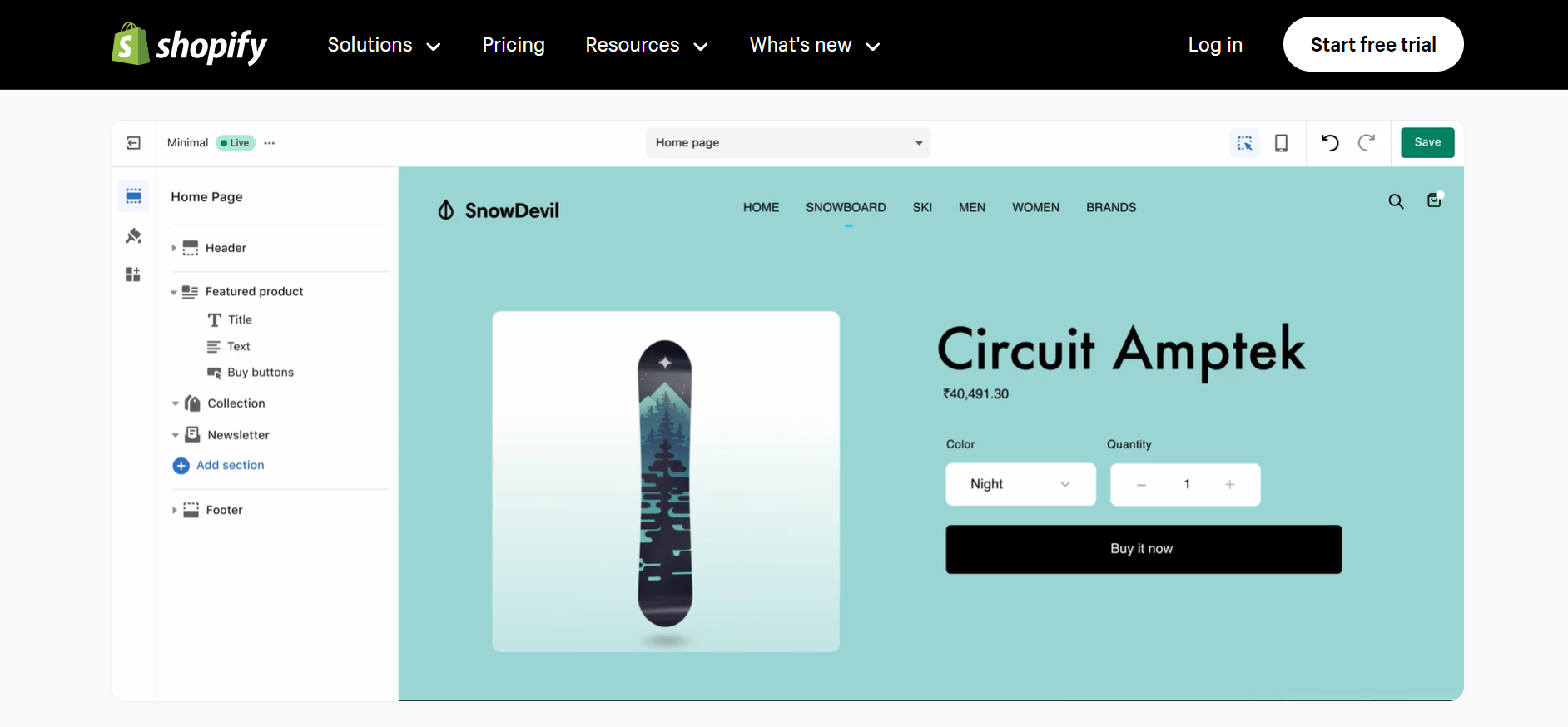
Pros:
- Wide range of integrations for drop shipping for easy selling without needing an inventory.
- Allows you to start free for a few days and gain experience.
- Designed specifically for e-commerce business.
- More than 100 no-code mobile-friendly themes, free SSL certificate, multiple themes, integrations, and plugins.
- Easy to set up within 4 minutes along with 24/7 support throughout your journey.
Cons:
- Slightly expensive, especially for those who want to access advanced features. There are additional costs involved.
- Limitations in product and checkout page customisation.
- While they offer 24/7 support, the quality of customer service has gone down.
Who is this for?
Shopify is best suited for those making over $10,000 dollars a month. It also suited for omnichannel sellers and those searching for an easy way to build a drop shipping business due to its many integrations. It may not be suitable for individuals who are just starting out.
Having an expert design your online store can be immensely helpful. We at Bloom Agency, take pride in our ability to help you stand out from the competitors. Whether it’s a complete design overhaul, custom designs, or modifications— our experts can help you with Shopify web design services.
2) Woo-commerce
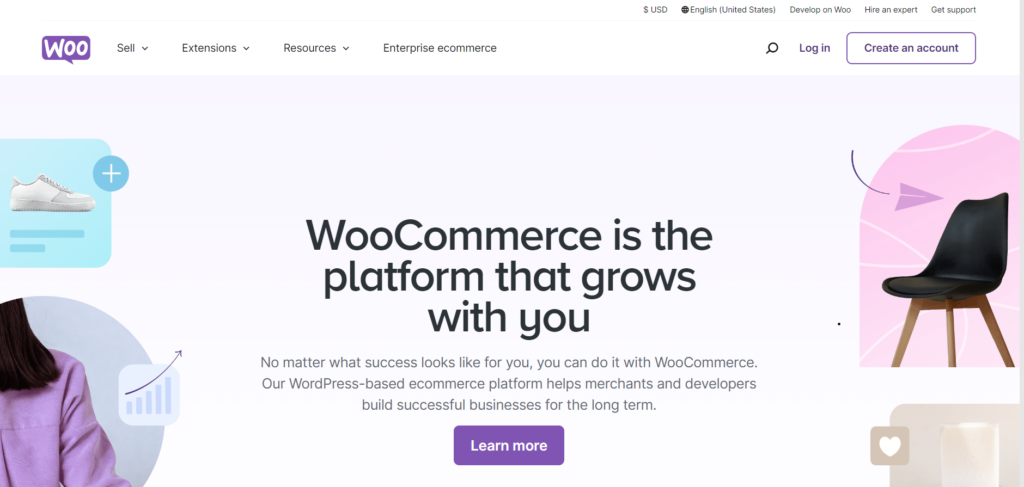
WooCommerce is the most used e-commerce platform above Shopify. The truth is that over 64% of sales using e-commerce use it.
Pros:
- Completely free! Yes, you heard that right. WooCommerce is 100% free, sort of. You only have to pay for hosting, which is also very affordable when compared to its competitors.
- Its larger user base provides you with a community for support, constant updates, and a wide range of resources.
- Boasts the largest library of plugin, templates, and apps of any e-commerce platform.
- User-friendly for beginners, like you and me.
- It’s fully customizable. You can change anything about your website.
- Self-hosted.
Cons:
- Some basic features require you to get plugins installed.
- Challenging to navigate, especially for beginners. You may need to hire a professional developer to set up and manage your store.
- Not always professional-looking. Needs significant customization and additional help.
- Poor technical support owing to its free, open-source service.
- It is a WordPress plugin, so you’ll need to invest some time to learn WordPress.
Who is this for?
WooCommerce is the top 1 choice for people just starting out in the e-commerce business. With its extensions, you can sell subscriptions, online courses, create coupon referral programs, select various shipping companies, and so on. Other than these, this site works greatly for those looking to build and manage a highly customisable online store.
Bloom Agency also provides WooCommerce Development Services, custom-made pages, with unique features. Our WooCommerce development team provides mobile-optimised and responsive solutions. Our team drove a store’s conversion rates by over 40% and engagement rate to nearly 50%. Have a conversation with our expert team today!
3) Square Online
Square Online, formerly known as Weebly, is deeply integrated into the Square system, more than likely operating seamlessly with Square’s sales interfaces. It therefore makes Square a great option for people who would like to both sell online and in person. Other benefits include:
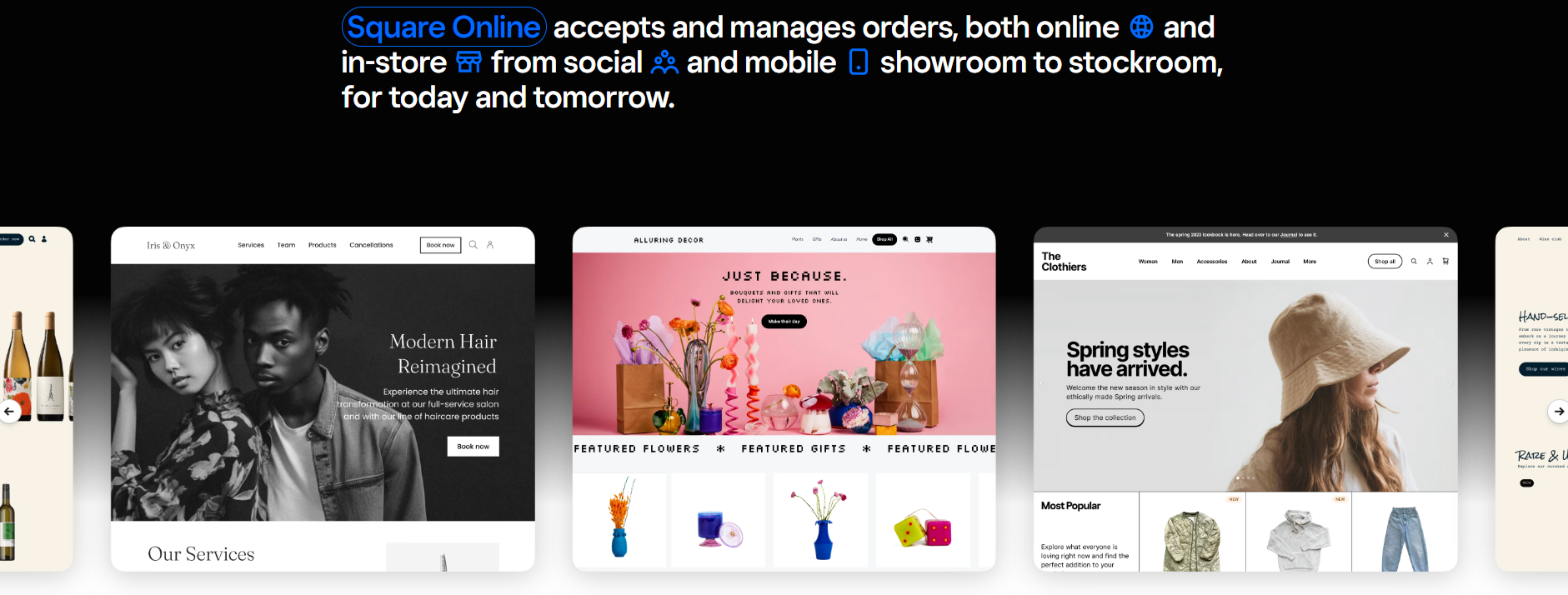
Pros:
- Unified management of sales, inventory, and customer data across online and offline channels— thanks to its POS systems.
- Affordable pricing plans, including a free tier.
- No transaction fees.
- Allows businesses to accept various payment methods.
- Provides in-built tools such as inventory management, SEO, and much more.
- Multichannel selling.
- Mobile-first store designs.
Cons:
- Primarily for people already familiar with Square for their physical store sales or payments.
- Lacks advanced e-commerce features, as it was not primarily built for the e-commerce industry.
Who is this for?
Square Online is perfect for small-businesses who want to make use of Square’s payment solutions to bridge the gap between online and in-store sales. It also works well for merchants who are already using this platform for their physical store. If you want something with reasonable pricing, and looking for a platform that makes managing sales across different channels easy— Square Online is for you!
4) Wix
Wix was initially built as a platform for creating websites. It now also offers e-commerce tools.
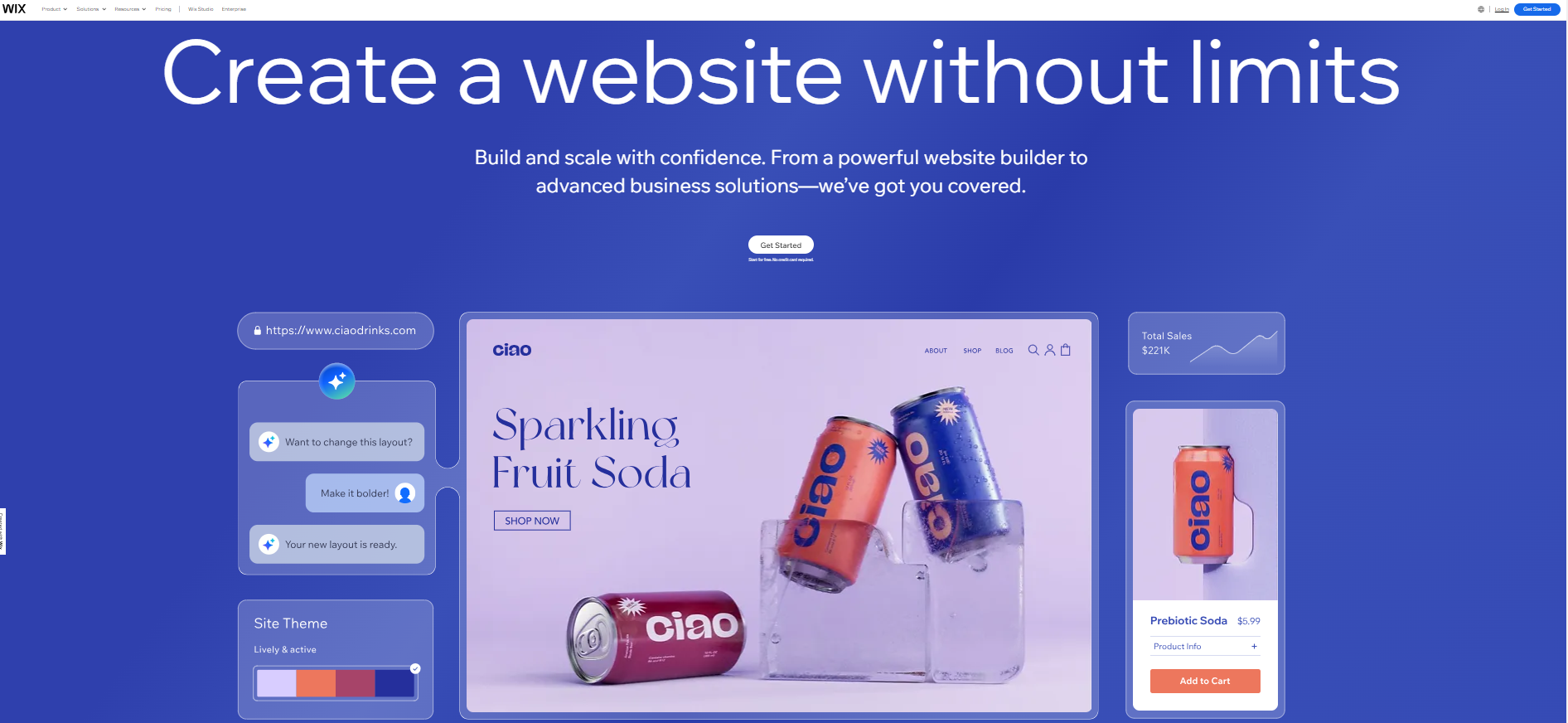
Take a look at its pros and cons:
Pros:
- Its drag-and-drop editor makes it simple for you to create and customise your online store.
- Range of templates allowing you to match your brand’s style and aesthetics.
- Various suites of e-commerce tools.
- Built-in SEO tools.
- Reasonable pricing.
Cons:
- Not as scalable as other platforms, like Shopify or BigCommerce.
- Transaction fee on sales.
- Lacks in certain areas as it is not a dedicated e-commerce platform.
- Some SEO limitations.
Who is this for?
Wix is great for companies who require an e-commerce platform that features clean design capabilities, at a low cost and with easy UI. Best suited for small to medium-sized businesses. It cannot be used in such vast and complex e-commerce operations. You can make use of this only when you’re already a small business but there’s also a dedicated e-commerce platform for you.
5) BigCommerce
BigCommerce is an independent e-commerce platform developed with the aim of helping all business sizes. Of the most popular companies using this e-commerce include Sony, Skullcandy and Ben & Jerry’s.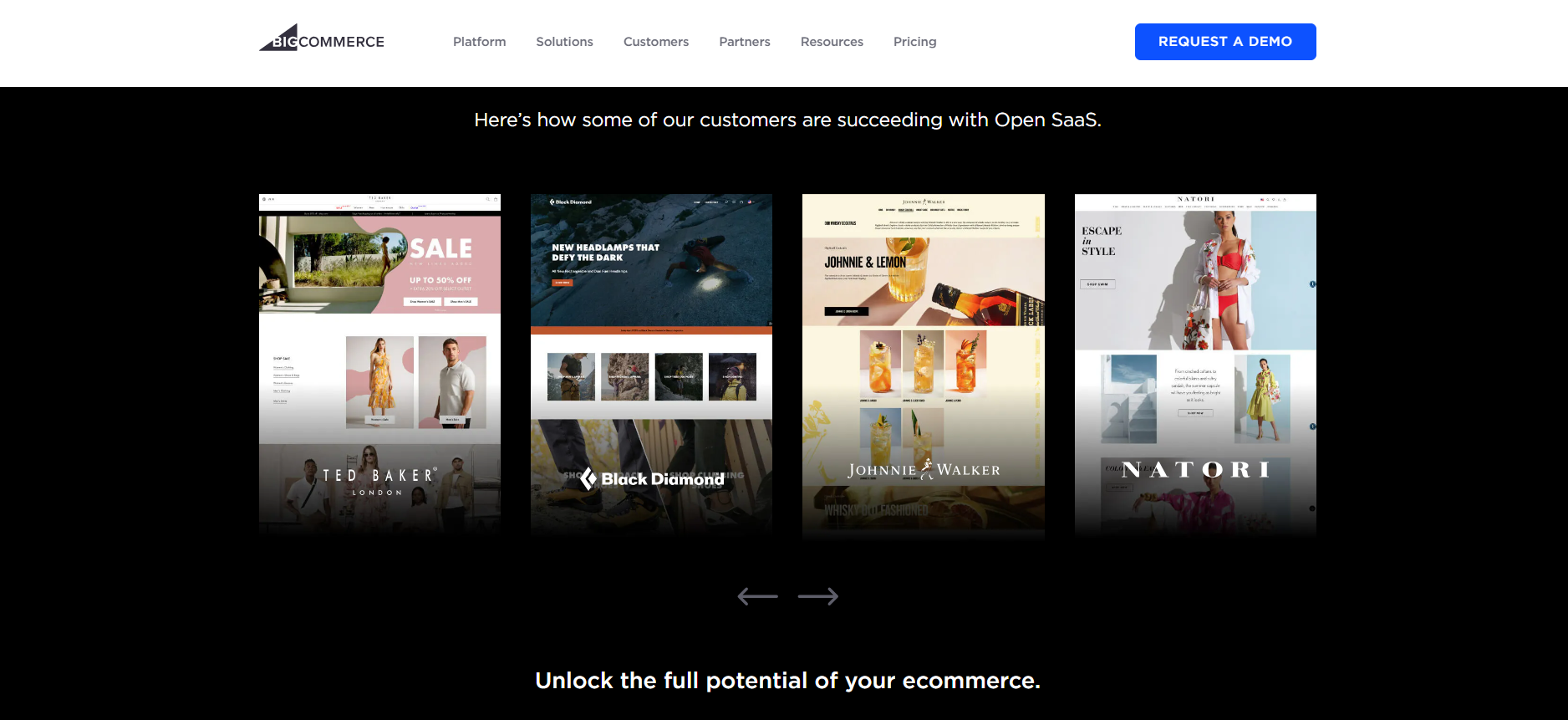
Here’s what it offers, and what it doesn’t:
Pros:
- No transaction fees on sales, benefiting businesses with high sales volume.
- Provides advanced e-commerce features, like multichannel selling, product variations, and detailed reporting.
- Strong SEO tools.
- Can handle large product catalogues and high traffic volumes, thus making it suitable for small businesses and large enterprises.
- A large selection of themes—around 240—that are mobile-friendly and customisable.
- Integration with third-party applications, including ERP systems, marketing tools, and payment gateways.
- Strong security features (SSL certificate, PCI-DSS compliance, and so on).
Cons:
- More expensive compared to other platforms.
- More complex to set up and use, especially for beginners.
- Additional costs from using premium themes, apps, and third-party integrations.
- Varying customer support.
Who is this for?
Overall, BigCommerce is extremely powerful and scalable e-commerce platforms that fit every need. However, its higher cost and complexity may make it not-so-ideal for smaller businesses or even businesses just starting to test the waters. If no harm is done by spending extra bucks (and your business is migrating to a bigger enterprise level, especially), then BigCommerce is worth trying!
For a team of experts designing your e-commerce site and the freedom to select from an enormous variety of professionally designed templates, consider Bloom Agency for your BigCommerce web design service.
6) Big Cartel
This e-commerce platform was initially designed for small businesses and independent creators and artists. Hence, it especially caters to designers, artists, and small brands who are looking for a simple platform to sell their products online. But is this the right choice?
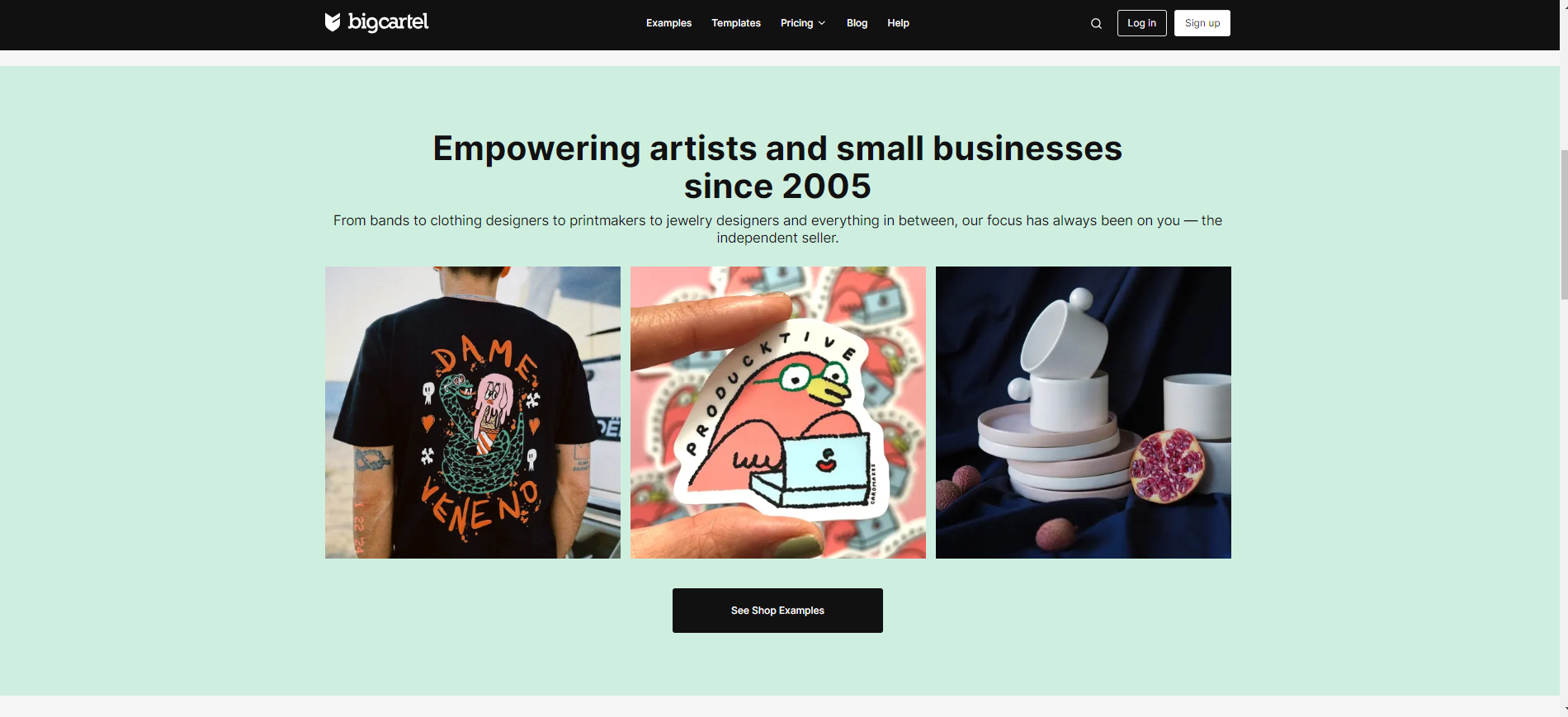
Pros:
- Easy to set up and manage.
- Low monthly fees. Also, the first five products are free!
- Limited customisable templates, but they are designed to be easily adaptable to suit different branding needs.
- Simple product management. You can do almost everything without complex configurations.
- Like other platforms, it also has built-in SEO tools.
- No transaction fees.
Cons:
- Fewer features and customisable options. May not be able to meet complex e-commerce needs.
- Limited integrations with third-party apps and services. This might restrict users who need advanced tools.
- Geared towards small businesses and independent sellers— meaning that growing businesses may outgrow this platform and will have to migrate.
Who is this for?
Big Cartel is an excellent choice for small businesses, artists, designers, and small brands. While it lacks advanced tools, its features might appeal to basic e-commerce needs. If you’re a small brand who is not yet going to explore advanced tools, Big Cartel can be your option.
7) SquareSpace
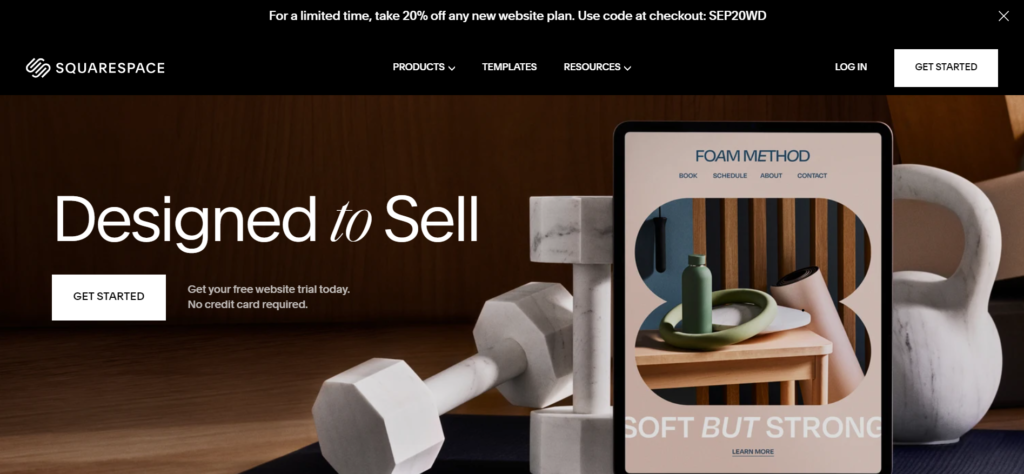
This platform is popularly known for its beautiful, aesthetic, elegant design templates. Although it was designed as a website builder, it evolved into a solution for managing online stores as well. It is widely used by individuals, small businesses, and creative professionals for its high-quality design options.
Pros:
- Over 150 customisable templates, which are renowned for their modern and professional design.
- Simple interface. Ease of use; known for its drag-and-drop editor.
- No need for technical skills.
- Great content management, with built-in blogging tools, multimedia integration, and image galleries.
- Provides analytics and insights.
- 24/7 customer support along with video tutorials and comprehensive knowledge base.
Cons:
- Lacks some advanced features found in dedicated platforms like BigCommerce or Shopify.
- Restrictions in customisations.
- Higher cost.
- Fewer integrations and third-party applications.
Who is this for?
Squarespace is well known for its visually appealing websites and online stores. It might be suitable for individuals and small brands that value design and simplicity. It is, however, not suitable for complex e-commerce needs.
8) Magento (now Adobe Commerce)

Adobe Commerce is known as formerly Magento Commerce; this is an e-commerce platform designed at the enterprise level by Adobe. It is recognized for being extremely flexible and scalable software.
Pros
- Caters to mid-markets and large enterprises along with small businesses.
- Designed to handle high-volume sales, extensive product catalogues, and complicated customisation requirements.
- Integration with Adobe Experience Cloud, providing access to additional tools for better digital marketing and customer engagement.
- Advanced security features, like SSL certificates and PCI-DSS compliance.
- Supports multiple stores from a single instance.
- Allows businesses to operate different brands or regional sites with ease.
- Mobile-friendly.
Cons:
- Quite expensive.
- May require consultants to fully leverage the platform’s capabilities.
- Increases operational costs.
- Overkill for businesses with simpler e-commerce needs or for smaller businesses.
Who is this for?
Adobe Commerce is extremely ideal for larger organisations. It is also suitable for growing and mid-sized businesses. Businesses that require customisation and integration with other systems will benefit from Adobe Commerce. And lastly, companies operating multiple stores or managing different brands will greatly benefit from this e-commerce platform.
Bloom Agency’s in-house teams provide tailored SEO plans for Magento (or Adobe Commerce) website owners. From audits, keyword research, and link building to technical SEO, Bloom Agency handles everything expertly. Let’s discuss your strategy without delay, check out our Magento development services.
Are you ready to choose?
With the list of e-commerce platforms provided, an e-commerce agency can help you contemplate your website’s unique needs and requirements along with providing e-commerce website developmenet services. Consider your budget, e-commerce goals, and the specific features that matter most to your online store. Whether you prioritize aesthetics, ease of use, or comprehensive functionality, take the time to evaluate each option carefully. Your choice should align with your business objectives and provide the tools required to build an online presence.



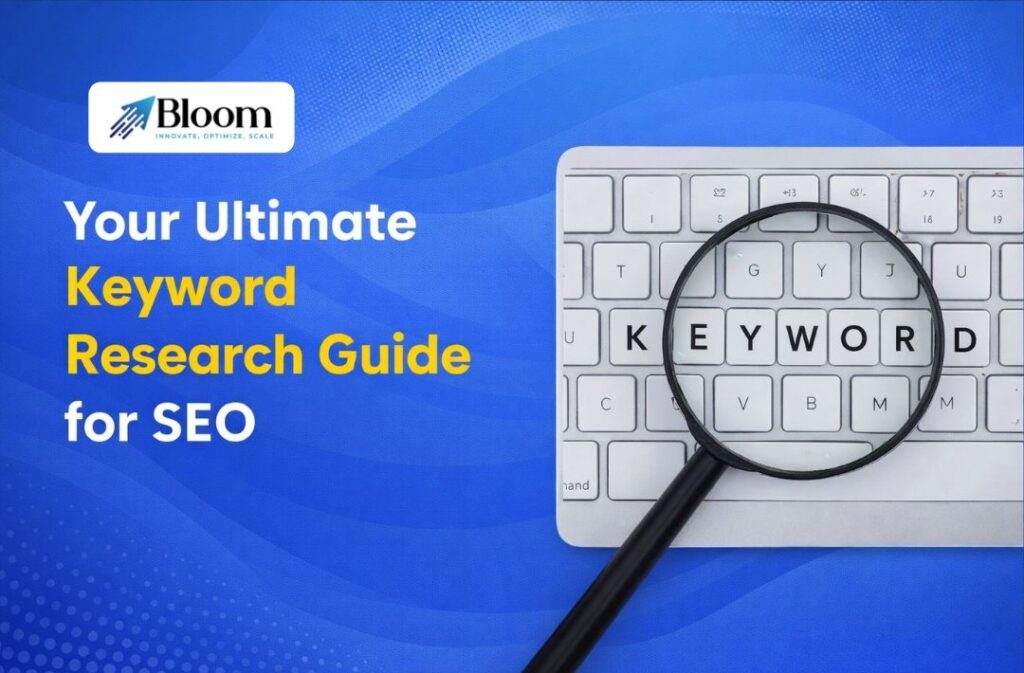
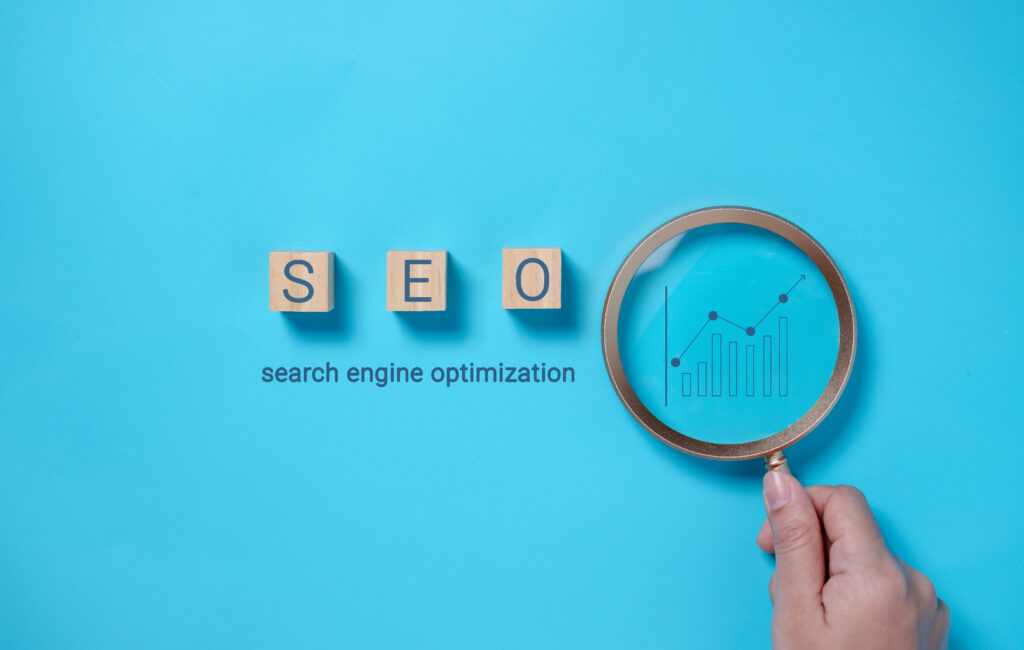



Rahul M.
B2B Service Provider